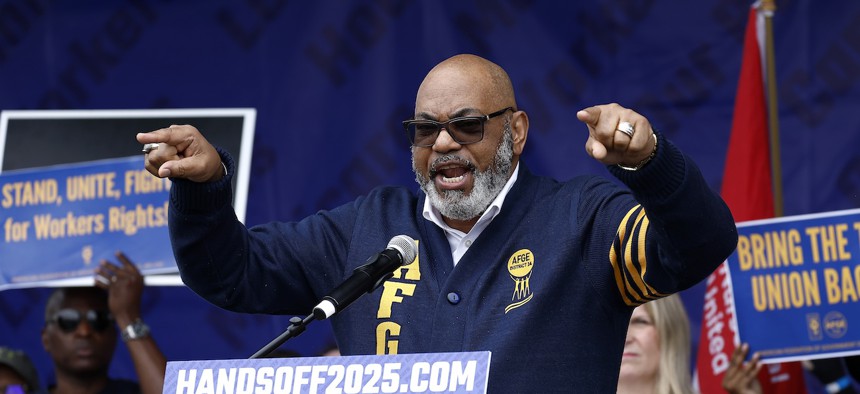
American Federation of Government Employees National President Everett Kelley during the Hands Off! day of action against the Trump administration and Elon Musk on April 5, 2025 in Washington, D.C. Kelley lauded the House’s decision to retain collective bargaining protections as part of the NDAA Paul Morigi/Getty Images for Community Change Action
House NDAA would exempt Defense civilians from union ban
Union officials said Friday that a discharge petition Is just two signatures shy of the 218 needed to force a floor vote on legislation to undo President Trump’s executive order barring collective bargaining at most federal agencies.
A provision to exempt civilian Defense Department employees from President Trump’s controversial executive orders aimed at stripping two-thirds of the federal workforce of their collective bargaining rights survived House debate on the annual Defense policy bill, which passed Wednesday by a vote of 231-196.
The March executive order, and its follow-up last month including another half dozen agencies, cited a seldom-used provision of the 1978 Civil Service Reform Act to ban unions across much of the federal government under the auspices of national security.
But in July, the House Armed Services Committee voted to include a provision in the fiscal 2026 National Defense Authorization Act (H.R. 3838) that would bar the use of fiscal 2026 funding to implement the edict on the Defense Department’s civilian workforce. Three Republicans crossed party lines to support the measure.
Though House Republicans successfully amended the must-pass legislation on the floor this week with partisan provisions like banning TRICARE coverage of gender-affirming medical care for military service members and their families, an amendment previously OKed by the House Rules Committee from Reps. Bob Onder, R-Mo., Scott Perry, R-Pa., and Russ Fulcher, R-Idaho, was not brought up for a vote, leaving the collective bargaining measure intact.
Union officials said House leadership’s reticence to bring Onder’s amendment forward is a sign that there is not sufficient GOP support for Trump’s efforts to excise them from the federal workplace. With the installation of Rep. James Walkishaw, D-Va., following Tuesday’s special election to succeed the late Rep. Gerry Connolly, a discharge petition for the Protect America’s Workforce Act (H.R. 2550), which would nullify Trump’s executive order altogether, is just two signatures away from the 218-member threshold to force the bill’s consideration on the House floor.
Successful discharge petitions are rare, though last year a bipartisan group of lawmakers successfully used the tactic to spur the enactment of the Social Security Fairness Act.
In a statement, American Federation of Government Employees National President Everett Kelley lauded the House’s decision to retain collective bargaining protections as part of the NDAA, and argued that federal employee unions have been an important catalyst for improved mission delivery since their inception.
“Federal workers have had the right to organize and bargain over working conditions and personnel policy for more than 60 years—and these rights have been strengthened and expanded over the subsequent decades by both Republican and Democratic administrations,” Kelley said. “Collective bargaining rights help improve federal operations, enhance government efficiency, and improve agencies’ recruitment and retention efforts. Restoring these rights for Department of Defense civilian employees will help strengthen and advance our mission.”
“The International Federation of Professional and Technical Engineers is pleased the bipartisan language to repeal the Trump union-busting order was preserved in the House-passed NDAA,” said IFPTE National President Matt Biggs. “The fact that this language was included underscores the bipartisan support that collective bargaining enjoys from a majority of congressional lawmakers. We look forward to working to protect it in the final conference report.”
Share your news tips with us: Erich Wagner: ewagner@govexec.com; Signal: ewagner.47
NEXT STORY: Feds fired en masse seek to compel oversight agency to investigate their cases







